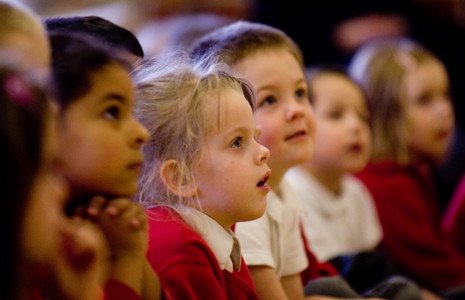
Assemblies 2024-2025
Please click the link below to see the assemblies and collective worship timetable:
Assembly and Collective Worship
At Sydenham Primary School we have a daily assembly, which is a time when members of our school are gathered together to pass on information of a secular nature (i.e. notices), as well as participate in collective worship.
All maintained schools must provide religious education and daily collective worship for all registered pupils, and promote their spiritual, moral and cultural development. Collective worship is legally required to take place every school day and must be wholly or mainly of a broadly Christian character, though not distinctive of any particular Christian denomination.
Sydenham Primary School is a community school, as we have pupils and staff from many different faith backgrounds, as well as those who have no religious beliefs or no faith background. During collective worship at Sydenham Primary School, pupils are provided with space for reflection.
What is meant by ‘worship’?
Collective worship is distinct from ordinary school activities, in that it reflects aspects of life that are mysterious, and it is concerned with experiences that stretch into what is not totally understood and beliefs about life that are still being thought through.
Collective worship enables pupils to reflect on:
-
what it means to be a human being
-
questions of meaning, purpose and value
-
the best that human beings can be – inspirational, exemplars (people of faith or not) who have demonstrated through their actions, lives and qualities. Examples will come from religious and non-religious sources.
-
personal beliefs and values
Our collective worship recognises and values the cultural, linguistic and religious diversity of the school population and will be conducted within Equal Opportunities policies.
Collective worship can enrich the experiences of pupils by:
-
enabling pupils to reflect on and question issues such as belonging to the school community, the wider community and to humanity as a whole
-
reinforcing a sense of community and cohesion through appreciating those things we have in common
-
developing a reflective approach to life
-
supporting pupils in the development of spiritual, cultural and moral perspectives.
-
developing a sense of the individual’s place in the world beyond the physical, material and the here and now
-
providing time to consider values and beliefs – both their own and those of others
-
raising awareness of difficulties experienced living a life based on values, beliefs and principles which may not be shared by everyone in the wider community
-
providing opportunity to celebrate achievement and to share times of celebration
-
supporting students in responding to crisis at a personal and collective level and provide them with a vocabulary to explore feelings and responses
-
supporting those who have particular needs or who are engaged in times of crisis
-
Collective worship reinforces the sense of our school community, by giving pupils the opportunity to share things of worth with each other, within a reflective space.
Those pupils who have a faith will be able to use the reflection time to consider issues in the light of their religious beliefs and to pray or worship internally as they feel appropriate, whilst those pupils who don’t have a religious belief will have the opportunity to reflect and make a personal internalised response to the same stimulus.
Staff and pupils do not have the right to withdraw from assembly, but may withdraw from collective worship